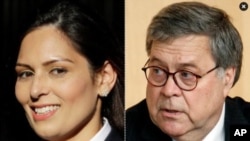ສະຫະລັດ ແລະອັງກິດໄດ້ເຊັນຂໍ້ຕົກລົງຢູ່ພາຍໃຕ້ກົດໝາຍໃໝ່ຂອງສະຫະລັດ ທີ່ມີ
ການໂຕ້ຖຽງກັນ ທີ່ຈະອະນຸຍາດໃຫ້ບັນດາອົງການເຈົ້າໜ້າທີ່ປະຕິບັດກົດໝາຍ ບັງຄັບ
ໃຫ້ບັນດາບໍລິສັດເທັກໂນໂລຈີເອົາການໂອ້ລົມສືສານກັນທາງເອເລັກໂຕຣນິກໃຫ້ ເພື່ອ
ໃຊ້ເຂົ້າໃນການສືບສວນການກະທຳຜິດທາງອາຍາບໍ່ກ່ຽວຂ້ອງວ່າບ່ອນເກັບກຳຂໍ້ມູນ
ໄວ້ນັ້ນຈະຢູ່ປະເທດໃດກໍຕາມ.
ສັນຍາດັ່ງກ່າວເປັນສັນຍາປະເພດນີ້ສະບັບທຳອິດ ທີ່ເຊັນຢູ່ພາຍໃຕ້ກົດໝາຍ CLOUD,
ຊຶ່ງເປັນກົດໝາຍໄດ້ຮັບຮອງເອົາໃນປີກາຍນີ້ ໂດຍລັດຖະສະພາທີ່ໄດ້ຖືກຕິຕຽນຢ່າງແຮງຈາກບັນດາປະເທດຢູໂຣບຈຳນວນນຶ່ງ ວ່າທຳກາຂົ່ມຂູ່ຕໍ່ສິດທິສ່ວນຕົວຂອງບຸກຄົນ.
ລັດຖະບານຝຣັ່ງໄດ້ຂະໜານນາມໃຫ້ມັນວ່າເປັນການຂົ່ມຂູ່ຕໍ່ “ອະທິປະໄຕທາງດີຈີຕອລ”
ຂອງປະເທດຕົນ ໃນຂະນະທີ່ເຢຍຣະມັນກໍໄດ້ສະແດງຄວາມເປັນຫ່ວງກ່ຽວກັບການທີ່
ພວກເຈົ້າໜ້າທີ່ສະຫະລັດພາກັນສືບຊອກຫາຂໍ້ມູນສ່ວນໂຕຂອງຊາວເຢຍຣະມັນທີ່ເປັນ
ສາມັນຊົນ.
ລັດຖະມົນຕີກະຊວງຍຸຕິທຳຂອງສະຫະລັດ ທ່ານວິລລຽມ ບາ ແລະລັດຖະມົນຕີກະ
ຊວງພາຍໃນຂອງອັງກິດ ທ່ານປຣິຕີ ພາແທລ ຜູ້ທີ່ໄດ້ເຊັນຂໍ້ຕົກລົງຢູ່ພິທີໃນນະຄອນ
ຫຼວງວໍຊິງຕັນໃນວັນພະຫັດວານນີ້ ໄດ້ຫາທາງການຫລຸດຜ່ອນຄວາມເປັນຫ່ວງເຫລົ່າ
ນັ້ນລົງ.ທ່ານບາ ກ່າວວ່າ “ຂໍ້ຕົກລົງດັ່ງກ່າວນີ້ຈະເຮັດໃຫ້ປະຊາຊົນທັງສອງປະເທດ ມີ
ຄວາມປອດໄພຫຼາຍຂຶ້ນ ໃນຂະນະເວລາດຽວກັນ ກໍຄ້ຳປະກັນວ່າໃຫ້ມີປົກປ້ອງທີ່ເຂັ້ມແຂງຂຶນຕໍ່ຄວາມເປັນສ່ວນຕົວ ແລະເສລີພາບພົນລະເຮືອນ.”
ທ່ານພາແທລ ກ່າວວ່າ “ພວກກໍ່ການຮ້າຍ ແລະພວກທຳຮ້າຍທາງເພດແກ່ເດັກນ້ອຍ
ໄດ້ໃຊ້ອິນເຕີແນັດ ເພື່ອແຜ່ຜາຍຄວາມກຽດຊັງຂອງເຂົາເຈົ້າ, ວາງແຜນໂຈມຕີຕໍ່ປະຊາ
ຊົນຂອງພວກເຮົາ ແລະແນເປົ້າໝາຍໃສ່ບ່ອນທີ່ໄດ້ຮັບຄວາມເສຍຫາຍງ່າຍທີ່ສຸດ. ໃນ
ນາມລັດຖະມົນຕີກະຊວງພາຍໃນ ຂ້າພະເຈົ້າໄດ້ຕັດສິນໃຈເດັດດ່ຽວທີ່ຈະເຮັດທຸກຢ່າງ
ຢູ່ໃນອຳນາດຂອງຂ້າພະເຈົ້າເພື່ອຢັບຢັ້ງພວກນີ້ໃຫ້ໄດ້.”
The United States and the U.K. have signed an agreement, under a controversial new U.S. law, that will allow law enforcement agencies to force tech companies to turn over electronic communications for use in criminal investigations regardless of which country the data is stored in.
The accord is the first of its kind signed under the CLOUD Act, a law passed last year by Congress that has been severely criticized by some European countries for threatening privacy rights.
The French government has labeled it a threat to its "digital sovereignty," while Germany has expressed concern about U.S. authorities snooping on ordinary Germans' personal data.
U.S. Attorney General William Barr and U.K. Home Secretary Priti Patel, who signed the agreement at a ceremony in Washington on Thursday, sought to mollify those concerns.
"This agreement will make the citizens of both countries safer, while at the same time assuring robust protections for privacy and civil liberties," Barr said.
"Terrorists and pedophiles continue to exploit the internet to spread their messages of hate, plan attacks on our citizens and target the most vulnerable," Patel said. "As home secretary, I am determined to do everything in my power to stop them."
The agreement comes with certain caveats. The two countries agreed to get each other's permission before using data acquired under the agreement in certain cases death penalty prosecutions in the U.S. and freedom of speech cases in the U.K.
Besides the U.K., no other country is known to have expressed interest in entering into a CLOUD Act agreement with the U.S.
Congress passed the law last year as the Supreme Court took up a case in which Microsoft challenged a government warrant to turn over electronic communications stored on the company's servers in Ireland. Microsoft argued that the U.S. warrant didn't apply to data held overseas. The company supported the CLOUD Act.
The law makes it easier for U.S. and other law enforcement agencies to acquire electronic communications stored outside their borders.
Normally, law enforcement organizations seeking those communications must submit a Mutual Legal Assistance Treaty (MLAT) request through their governments, a cumbersome process that can take up to two years.
The new U.S-U.K. Bilateral Data Access Agreement will allow law enforcement agencies to bypass the MLAT system, dramatically speeding up the data collection process.
Under the accord, law enforcement agencies can now go directly to tech companies in the other country and demand electronic data, as long as they receive court authorization.
"Only by addressing the problem of timely access to electronic evidence of crime committed in one country that is stored in another, can we hope to keep pace with twenty-first-century threats," Barr said.





